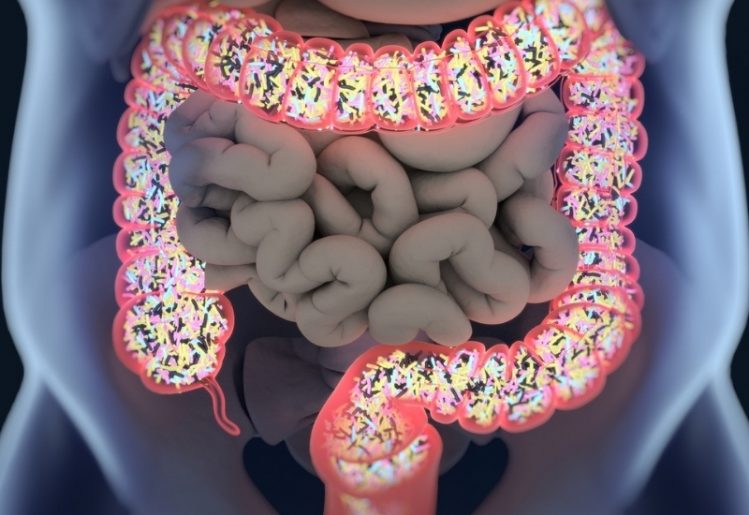Not all bacteria are nefarious germs that spread disease and cause illness. The human body is host to a vast community of beneficial bacteria that play a role in maintaining optimal health. In fact, there are 10 trillion more bacteria in the body than human cells — all of which exist in the gut microbiome. Located in the large intestine, this community of microbes serves a broad range of functions. The bacteria in the gut help regulate health for the heart, digestion, immunity and many other biological systems. New advancements in gut health research reveal that the health of the gut microbiome plays a part in both brain health and the development of type 2 diabetes.
Why is the Gut Microbiome Important?
 There are many different factors that help form the gut microbiome. Bacteria begin finding their way to this part of the large intestines immediately after birth; some research suggests the formation of the gut microbiome begins even before birth. Because diet is a significant factor in creating a diverse gut microbiome, a pregnant mother’s diet can influence the unborn child’s microbiome. Once a baby is born, both environment and diet play a part in introducing new types of bacteria into the microbiome.
There are many different factors that help form the gut microbiome. Bacteria begin finding their way to this part of the large intestines immediately after birth; some research suggests the formation of the gut microbiome begins even before birth. Because diet is a significant factor in creating a diverse gut microbiome, a pregnant mother’s diet can influence the unborn child’s microbiome. Once a baby is born, both environment and diet play a part in introducing new types of bacteria into the microbiome.
Research over the past decades has revealed that bacterial strands, or types, influence how we develop into adulthood. For instance, the presence of certain types of bacteria can determine the likelihood that you’ll experience obesity or other metabolic conditions in your lifetime. There are also microbes in the gut that n determine the risk for developing certain types of diseases, which is why new research is focusing on identifying the functions of certain types of bacteria in the gut.
Gut Health Research Finds Link Between Gut Microbiome and Diabetes
In a recent study, researchers found evidence that the way the gut microbiome fluctuates on a day-to-day basis may indicate the onset of type 2 diabetes. The study focused on the correlation between the circadian rhythm, or the body’s biological clock, and the activity in the gut microbiome. By studying a group of 2,000 healthy adults, the team discovered that the gut microbiome fluctuates in connection with the circadian rhythm, producing reliable movements during each day.
Upon examining the guts of people with metabolic syndrome, obesity and type 2 diabetes, they found that the bacterial communities in their guts did not fluctuate as actively. This helped the researchers identify a rhythmic cycle that the gut goes through during each 24-hour period. This cycle slows considerably in people suffering from metabolic conditions. The study also identified biological markers that could suggest the rhythm was beginning to slow, leading the researchers to suspect the gut’s activity could be used to predict the onset of type 2 diabetes.
Specifically, researchers found 13 different strands of bacteria that didn’t change in at-risk subjects. The study couldn’t determine if these bacterial strands played a part in causing type 2 diabetes, or if they were merely affected by the same process. Ongoing research will continue to determine the relationship between these bacterial strands and the development of diabetes, but, in the meantime, researchers are hopeful that these findings can be used to help diagnose type 2 diabetes sooner.
Study Finds a Link Between Gut Bacteria and a Brain Blood Vessel Defect
Another study focused on the link between the bacterial community in the large intestines and the development of cavernous angiomas (CA), which is an abnormal blood vessel in the brain. Although only 0.5 percent of the world’s population develops this defect, a large number of people who do develop the condition experience symptoms that include headaches, vision problems, seizures and strokes. A new study looked at the relationship the gut microbiome might share with the development of the CA blood vessel abnormality.
The researchers examined 122 people with a confirmed CA and compared their gut microbiomes to subjects who did not have the blood vessel defect. The CA subjects were found to have specific strands of bacteria that weren’t found in the guts of the healthy subjects. The CA subjects also exhibited a higher presence of lipopolysaccharide molecules. The researchers hope that they can use this gut health research to make it easier to diagnose those with CA. They also hope the differences in the gut microbiomes will also help them measure the severity of the blood vessel disorder’s effect on the brain.
How Can You Maintain a Healthy Gut Microbiome?
Eat More Fiber
 Fiber carries plenty of helpful bacteria to the gut, while also lowering the risks of some types of cancer and heart disease. It can also help with weight loss by controlling hunger cravings.
Fiber carries plenty of helpful bacteria to the gut, while also lowering the risks of some types of cancer and heart disease. It can also help with weight loss by controlling hunger cravings.
Choose a Wider Variety of Foods
Your meals should consist mainly of fruits, vegetables, nuts and seeds to provide the vitamins and nutrients you need each day. Additionally, choosing a variety of colors in selecting your fruits and vegetables will help you boost the health of your gut. Each type of food contains a different community of bacteria, which will help diversify your gut microbiome.
Consume More Polyphenols
Certain foods and drinks, like olive oil, coffee, tea, berries, nuts and seeds, contain polyphenols. The polyphenols are antioxidants that help sustain the bacteria in your gut.
Limit Your Snacking
Eating creates more activity in the gut, which distracts the bacteria in your gut from fulfilling other functions. If you can skip meals, or fast for one or two days a week, you can give your gut microbiome even more time to benefit your health.
Eat Fermented Foods
Some examples of fermented foods include kimchi, plain yogurt, sauerkraut and cheeses. Fermented foods contain a higher concentration of microbes, so eating these foods regularly can help you build a more diverse microbiome.
Supplement Your Diet With a Prebiotic/Probiotic Formula
If you aren’t sure whether your diet is providing the wide array of microorganisms needed for a functioning gut microbiome, try supplementing with a high-quality formula that contains both prebiotics and probiotics. Prebiotics are indigestible fibers that help to nourish the probiotics, or “friendly” bacteria, in the gut.


